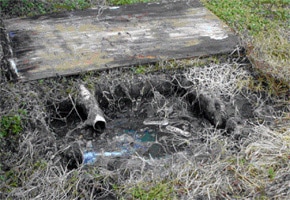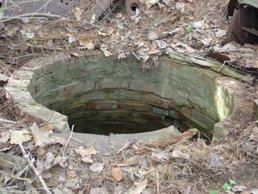Oil Tanks and Septic Tanks
(Wells & Cisterns too)
and why they need inspections
|
Underground Oil Tanks
Leaks from oil tanks are the most caustic because oil is a complex chemical that does not break down easily in the environment, and thus requires soil removal and reclamation. |
Septic Tanks
Leaks from Septic tanks, depending on severity, can usually be treated such that naturally occurring organisms in the environment can break down the sewage deposits into safe nutrient deposits in the ground. |
Wells & Cisterns
Wells and cisterns are the least hazardous to the environment because they should only contain water, but they can be a serious problem for the homeowner or resident if a proper volume is not sufficiently available year-round, and the quality of the drinking water is not acceptable or safe. |
Whatever tank you have buried underground on your property, it is prone to leaking, unless it is relatively new. And even if it is constructed of a modern composite non-corroding material, is still suffers from the changes and abuses of nature. Because it is underground and out of sight, it is not obvious that a tank has sprung a leak until the leak is serious enough that the property owner or resident notices a liquid, a smell, or a depression growing on or in the ground. At that point it is too late and the expenses can be huge.
With today's environmental protection safeguards, the states and jurisdictions in the Washington, DC area have requirements for the testing of underground systems, and reporting of groundwater infiltration of byproducts considered hazardous to the environment. These hazards include fuel oil and sewage, whether treated or untreated. And since the rainwater from our area eventually drains into the Chesapeake Bay, controlling and eliminating these caustic chemicals from entering the watershed is important for the health of the Bay and for the food we gather from the Bay. This is why DC, Maryland, and Virginia have all established testing, replacement, and notification requirements for these systems. Links to some of the state and local requirements are listed in the More Info section below.
While locating and visual inspections of oil and septic tanks, and wells and cisterns are something that MHBI can do, having a trained, certified, and licensed company or individual perform a complete inspection of these systems is imperative if you are buying or selling a property. Not knowing the condition of what you are buying, may cost you thousands of dollars in removal, environmental cleanup, and replacement if a system has failed or is failing and requires replacement.
And while some home inspectors claim to be able to perform an inspection on these systems, unless they are trained and certified, and in some cases required to be licensed in the specific trade, the inspection is what is called a "walk-over" inspection, which is really no inspection at all. MHBI does not generally recommend or refer to other companies, but when it comes to helping the buyer or seller feel confident about the condition of systems on a subject property, we really want to help you get a professional inspection and evaluation of these systems so a valid opinion can be provided on their condition.
With today's environmental protection safeguards, the states and jurisdictions in the Washington, DC area have requirements for the testing of underground systems, and reporting of groundwater infiltration of byproducts considered hazardous to the environment. These hazards include fuel oil and sewage, whether treated or untreated. And since the rainwater from our area eventually drains into the Chesapeake Bay, controlling and eliminating these caustic chemicals from entering the watershed is important for the health of the Bay and for the food we gather from the Bay. This is why DC, Maryland, and Virginia have all established testing, replacement, and notification requirements for these systems. Links to some of the state and local requirements are listed in the More Info section below.
While locating and visual inspections of oil and septic tanks, and wells and cisterns are something that MHBI can do, having a trained, certified, and licensed company or individual perform a complete inspection of these systems is imperative if you are buying or selling a property. Not knowing the condition of what you are buying, may cost you thousands of dollars in removal, environmental cleanup, and replacement if a system has failed or is failing and requires replacement.
And while some home inspectors claim to be able to perform an inspection on these systems, unless they are trained and certified, and in some cases required to be licensed in the specific trade, the inspection is what is called a "walk-over" inspection, which is really no inspection at all. MHBI does not generally recommend or refer to other companies, but when it comes to helping the buyer or seller feel confident about the condition of systems on a subject property, we really want to help you get a professional inspection and evaluation of these systems so a valid opinion can be provided on their condition.
More Info.
Below are links to governmental agencies that provide information on these important systems.
Septic System Information
* Maryland Department of the Environment (MDE) Homeowner Septic Information
* Maryland Updated 2016 Tank Replacement Regulations
* Montgomery County Well & Septic Information
* Virginia Department of Health (DEH) Septic Information
* US EPA Septic System Information
Well Information
* Well Information from WellOwner.org
Residential Oil Tank Information (not federally regulated)
* Washington, DC website link
* Maryland website link or call the Oil Control Program at (410) 537-3442 or (800) 633-6101 x3442
* Virginia website link
Emergency Oil Leak Response Contacts
* Washington, DC - call DC Fire Prevention Division at (202) 727-1614, AND
DDOE’s UST-LUST at (202) 535-2600 (during business hours) of the release or suspected
release within 24 hours. After hours, contact the Mayor's Command Center at (202) 727-6161.
* Maryland - contact your local fire department or call 866-633-4686 (24/7)
* Virginia - call 804-698-4000 or 800-592-5482
Companies that provide inspections on these systems:
Septic Systems
Maryland:
* Fogles Septic 301-795-5670
* Ralph Carlisle 301-509-2468
* Hatfield Septic 301-490-4289
* Homeland Farm Septic 301-984-0047
* Environmental Septic & Waste 301-253-1400
Virginia:
*
Well Systems
*
Oil Tanks
Virginia:
* Pollard Environmental - www.OilTanks.net
Maryland:
* MD Dept of the Environment (MDE) Underground Storage Tank (UST)
List of certified companies (2018)
* MD Dept of the Environment (MDE) UST List of Installers & Removers (2019)
* MD Dept of the Environment (MDE) UST List of Inspectors (2019)
Septic System Information
* Maryland Department of the Environment (MDE) Homeowner Septic Information
* Maryland Updated 2016 Tank Replacement Regulations
* Montgomery County Well & Septic Information
* Virginia Department of Health (DEH) Septic Information
* US EPA Septic System Information
Well Information
* Well Information from WellOwner.org
Residential Oil Tank Information (not federally regulated)
* Washington, DC website link
* Maryland website link or call the Oil Control Program at (410) 537-3442 or (800) 633-6101 x3442
* Virginia website link
Emergency Oil Leak Response Contacts
* Washington, DC - call DC Fire Prevention Division at (202) 727-1614, AND
DDOE’s UST-LUST at (202) 535-2600 (during business hours) of the release or suspected
release within 24 hours. After hours, contact the Mayor's Command Center at (202) 727-6161.
* Maryland - contact your local fire department or call 866-633-4686 (24/7)
* Virginia - call 804-698-4000 or 800-592-5482
Companies that provide inspections on these systems:
Septic Systems
Maryland:
* Fogles Septic 301-795-5670
* Ralph Carlisle 301-509-2468
* Hatfield Septic 301-490-4289
* Homeland Farm Septic 301-984-0047
* Environmental Septic & Waste 301-253-1400
Virginia:
*
Well Systems
*
Oil Tanks
Virginia:
* Pollard Environmental - www.OilTanks.net
Maryland:
* MD Dept of the Environment (MDE) Underground Storage Tank (UST)
List of certified companies (2018)
* MD Dept of the Environment (MDE) UST List of Installers & Removers (2019)
* MD Dept of the Environment (MDE) UST List of Inspectors (2019)








